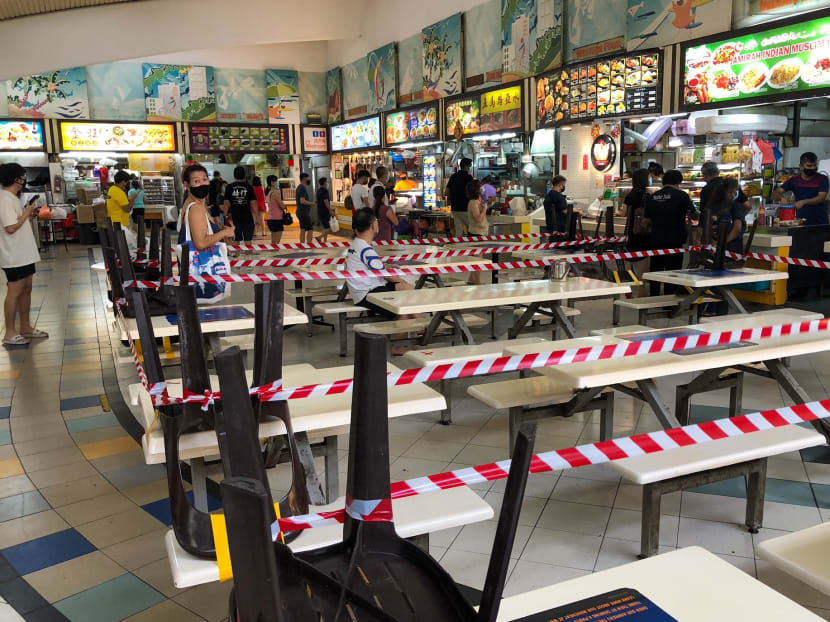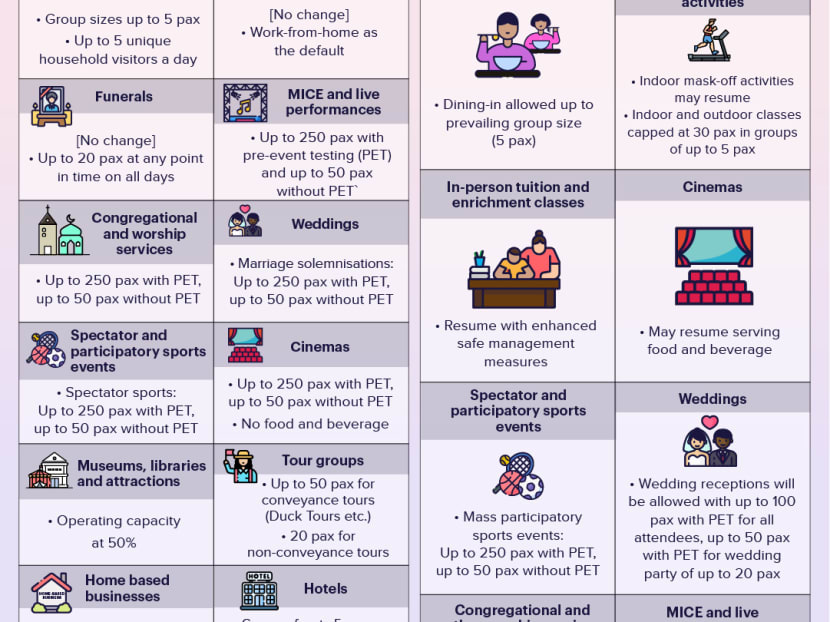Up to 5 persons for social gatherings from June 14; dining-in resumes from June 21 ‘if situation remains under control’
SINGAPORE — From June 14, the maximum size of social gatherings and the number of distinct visitors to households in a day will be increased to five from the current two.

Dining will resume at food-and-beverage outlets from June 21, 2021, but with stronger enforcement to catch any breaches.
- Maximum size of social gathering will increase from two to five from June 14
- The number of distinct visitors to households will also go up from two to five
- Dining-in to resume from June 21 if the Covid-19 situation remains under control
- Work-from-home continues to be the default arrangement
SINGAPORE — From June 14, the maximum size of social gatherings and the number of distinct visitors to households in a day will be increased to five from the current two.
And “if the situation remains under control” after this, dining-in at food-and-beverage (F&B) establishments will resume from June 21, said the Ministry of Health (MOH) on Thursday (June 10) as it laid out a two-step plan of gradually reopening Singapore under Phase Three (Heightened Alert).
This follows one month of tighter restrictions under Phase Two (heightened alert).
The Ministry of Health (MOH) said that as Singapore moves out of this phase in the coming weeks, working from home will remain the default requirement.
The ministry added that it “remains essential that we continue to keep transmission risks in check by reducing overall footfall and interactions at common spaces at or near the workplace, and in public places, including public transport”.
Announcing the relaxing of safe distancing measures at a press conference on Thursday, Finance Minister Lawrence Wong, who is co-chair of the Government's Covid-19 task force, said: “It's not quite the full Phase Three. We call this Phase Three (heightened alert) because there are still these restrictions in place.
“And that's because we are reopening in a cautious and controlled manner, and maintaining very strict controls at our borders. We need all of these controls in place until our vaccination rates are higher.”
Health Minister Ong Ye Kung, who also co-chairs the task force, said: “We managed to break the chain of transmission, I think, and control this wave of transmission, without a painful circuit breaker (to halt most activities)”.
However, he noted that Singapore is “not totally out of the woods” as the seven-day moving average for Covid-19 cases is still 11.9 and needs to be lowered further.
While the number of community cases has been low since June 6, these numbers have to be sustained for one full incubation cycle — at least 14 days — before the country can feel more assured that most of the “embers of this virus” have been put out, Mr Ong said.
Associate Professor Kenneth Mak, the director of medical services at MOH, said at the same press conference that the next week will be important for the authorities to “confirm (their) assessment” that community transmission is under control.
“The fact that we see occasional, unlinked cases in the community indicates that cryptic (hidden) spread of infection in the community has been suppressed but has not been eradicated,” he said.
“If we drop our guard, be complacent, lose our discipline in practising mask wearing and stop adhering to safe management measures as we lighten up on Phase 2 (heightened alert) measures, more unlinked cases can easily arise,” he added.
“And given the presence of viral variants of concern, particularly the Delta variant (formerly known as the B16172 variant), which is said to be more transmissible in close settings, large clusters of cases can easily arise over a short period of time.”
Dr Mak thus said that it is “prudent” for reopening to be paced and progressive, so that the increased social, community and workplace activities that result from reopening do not lead to an increase in new cases.
Even as the maximum size of social gatherings has increased, MOH said that people should continue to limit their social circle to a small group of regular contacts and not have more than two meet-ups in a day.
The resumption of dining-in at F&B outlets from June 21 will come with stronger enforcement by the authorities to detect any breaches of regulations.
MOH said that F&B outlets should make sure that diners do not dine in groups of more than five, and that each group is at least 1m apart from each other to mitigate the risk of transmission between unmasked individuals.
Mr Wong said he understands that F&B owners are disappointed that they can resume operations only on June 21.
“I would ask all of them to take, make use of the one week to really go through their processes, their protocols, and make sure that your restaurant layouts comply fully with the rules, that diners, when they come in, will be 1m apart at least, and have good ventilation in their restaurants because we know that these are high-risk settings,” he added.
On the continuing default setting for working from home, MOH said that it was important to reduce interactions.
“Employers must ensure that employees who are able to work-from-home do so, continue to stagger start times of employees who need to return to the workplace, and implement flexible working hours. There should continue to be no cross-deployment of workers to multiple worksites,” MOH said.

During the press conference, a question was also asked on what had gone wrong in the containment measures previously — given that Singapore saw infections go up even though it reopened in a cautious manner, and what lessons the authorities have learned from it.
Mr Wong responded that it was normal to have cases emerge as Singapore eased some restrictions and resumed more activities.
“A key to containing it is to make sure that even when cases do emerge, we keep the situation under control, and we do not allow large clusters from breaking out in the community.”
Such control measures would include doing more aggressive testing, more comprehensive contact tracing and vaccinating more residents.
Responding to the same question, Mr Ong said that since the recent spike in Covid-19 cases came from those who arrived from overseas, the authorities have learnt that they have to be “a lot tighter on borders”, referring to added measures that were taken to tighten travel restrictions in recent weeks.
When asked what is Singapore’s eventual Covid-19 strategy given that it will be endemic and there will be flare-ups when borders are opened, Mr Wong said that it will be very hard to give a full picture now as it is a work in progress.
He could only say that it will include achieving a high vaccination rate and having more risk-based, targeted safeguards within the community and at the borders.
Mr Ong said that Singapore’s considerations for opening up the economy are no longer tied to daily infection numbers as much as before.
Instead, it is looking increasingly at the capabilities it has built in suppressing every cluster, as well as in testing, quarantine, contact tracing and vaccinations.
“So I think these are some shifts that you start to see. And then, I really hope we are putting a circuit breaker (to halt most activities) as a tool behind us (and) in future, with capabilities like these, we don't have to resort to big sledgehammer approaches like circuit breakers,” he said.
.embed-container { position: relative; padding-bottom: 56.25%; height: 0; overflow: hidden; max-width: 100%; } .embed-container iframe, .embed-container object, .embed-container embed { position: absolute; top: 0; left: 0; width: 100%; height: 100%; }







